Global Health and Environmental Microbiology
Fundamentals and emerging issues of health significant microorganisms (bacteria, viruses, protozoa) from water, air, soil and food, and their sources, transmission routes,
treatments, detection methods and study tools.
Prerequisites: Cross listed in Food Science and Technology
Learn more
|
Climate Change and Human Health
Global climate change may have considerable direct and indirect impacts on human health. This course will be based on scientific facts, focusing on both natural phenomena and anthropogenic activities, with emphasis on associations between disease initiation and progression in humans. Formerly listed as PUBHEHS 5320.
Prerequisites: None
Learn more
|
Environmental Epigenetics
Epigenetics is an exciting and rapidly growing field of science, with increasing applications in molecular biology, epidemiology and environmental science. Epigenetics is the study of biological mechanisms that will influence exposed host gene expression without altering DNA sequences. Epigenetic patterns of individuals can change over time by different environmental influences that explain a link between nature and nurture. For example, how identical twins with the same genetically information show different susceptibilities to disease. One of the mechanisms is changes in DNA methylation. The course will provide a solid foundation in epigenetics and introduce the basic mechanisms of epigenetic control of gene expression, major laboratory methods, and research applications of in molecular biology, epidemiology, and the environmental sciences.
Prerequisites: Prereq: Credit for college level Biology (or related discipline) course, or permission of instructor
Learn more
|
Molecular Techniques for Environmental Health Sciences
This course provides students with a practical, "hands-on" introduction to a variety of techniques applied to the study of living systems at the molecular level to address fundamental public health concerns.
Prerequisites: None
Learn more
|
Major Human Diseases in Global Public Health
Public health is focused on preventing illnesses and injuries or intervening to decrease the impact to populations of people. Emphasize on basic physiology, pathophysiology, and clinical evaluation of major human diseases that have significant global public health impact epidemiologically, politically, and economically with a focus on disease causes and prevention.
Prerequisites: none
Learn more
|
PUBHEHS 7193
Credits: 1‐6
Individual Studies in Environmental Health Sciences
Individual studies in Environmental Health Sciences focusing on
applied topics.
Prerequisites: none
Learn more
|
PUBHEHS 7194
Credits: 1‐3
Group Studies in Environmental Health Sciences
Group studies in Environmental Health Sciences.
Prerequisites: none
Learn more
|
PUBHEHS 7350
Credits: 1‐3
Special Topics in Environmental Health Sciences
Opportunity for students to pursue a particular environmental health interest that is not available through existing topical
offerings.
Prerequisites: none
Learn more
|
Water Contamination: Sources and Health Impact
Topics focus on understanding the sources, the transport mechanisms and the fate of microbial and chemical contaminants in water, human exposure risks, tracking methods, linking to other environmental matrices and the public health impacts.
Prerequisites: Undergraduate-level biology or permission of instructor
Learn more
|
Environmental and Human Health Risk Assessment
Students will learn about the development of the formal risk assessment process, its role in environmental and public health regulation in the United States and the four fundamental steps in a risk assessment. Students will learn about the interface between the risk assessment and risk management process.
Prerequisites:
Learn more
|
Quantitative Microbial Risk Analysis Modeling
This course will outline the fundamental sciences and their application in microbial risk modeling.
Prerequisites: Graduate level statistics or permission of instructor
Learn more
|
Exposure Science Monitoring Techniques I
This course will discuss the principles and practices of human exposure sampling of contaminants in environmental and biological matrices with special emphasis on the air matrix. In addition, students will be introduced to analytical techniques and instrumentation for air contaminants in the course.
Prerequisites: none
Learn more
|
Environmental Health Analytical Chemistry
This course will emphasize the principles and practices of human exposure sampling and analysis of contaminants in air, water and soil, as well as analysis of biological specimens (i.e. saliva, urine, exhaled air, blood) for markers of exposure. The course will focus on field sampling, and laboratory analytical instrumentation and methods.
Prerequisites: Graduate standing or permission of instructor.
Learn more
|
PUBHEHS 7899
Credits: 1‐3
Seminar in Environmental Health Sciences
Seminar on topics that are relevant to students enrolled in programs in the division of environmental health sciences.
Prerequisites: none
Learn more
|
Molecular Techniques for Environmental Health Sciences
Practical introduction to molecular techniques, as applied to
research in environmental health sciences.
Prerequisites:
Learn more
|
PUBHEHS 8899
Credits: 1‐3
Doctoral Seminar in Environmental Health Sciences
Doctoral level seminar on topics that are relevant to students enrolled in the PhD program in health environmental health
sciences.
Prerequisites: none
Learn more
|
Epidemiology in Public Health
The course will cover the principles and procedures in the field of epidemiology, with a focus on the application of the principles of epidemiology.
GEN theme health and well-being course.
Prerequisites: none
Learn more
|
PUBHEPI 3193
Credits: 1‐6
Individual Studies in Epidemiology
Individual studies in Epidemiology focusing on applied topics.
Prerequisites: Permission of instructor.
Learn more
|
Honors Case Studies in Public Health
This is an advanced undergraduate course in epidemiology that is designed for Honors students in Public Health or a related field. Students will learn about how epidemiology is used in the field of Public Health through a case study approach.
Prerequisites: Honors standing, and 2410.
Learn more
|
Public Health Field Investigation
This course provides an applied study in investigating and responding to outbreaks, disasters, and other acute public health events.
GEN theme health and well-being course.
Prerequisites: None
Learn more
|




